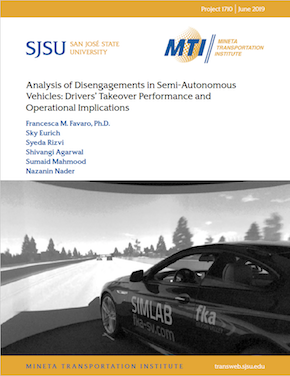- 408-924-7560
- mineta-institute@sjsu.edu
- Donate
Analysis of Disengagements in Semi-Autonomous Vehicles: Drivers’ Takeover Performance and Operational Implications
This report analyzes the reactions of human drivers placed in simulated Autonomous Technology disengagement scenarios. The study was executed in a human-in-the-loop setting, within a high-fidelity integrated car simulator capable of handling both manual and autonomous driving. A population of 40 individuals was tested, with metrics for control takeover quantification given by: i) response times (considering inputs of steering, throttle, and braking); ii) vehicle drift from the lane centerline after takeover as well as overall (integral) drift over an S-turn curve compared to a baseline obtained in manual driving; and iii) accuracy metrics to quantify human factors associated with the simulation experiment. Independent variables considered for the study were the age of the driver, the speed at the time of disengagement, and the time at which the disengagement occurred (i.e., how long automation was engaged for). The study shows that changes in the vehicle speed significantly affect all the variables investigated, pointing to the importance of setting up thresholds for maximum operational speed of vehicles driven in autonomous mode when the human driver serves as back-up. The results shows that the establishment of an operational threshold could reduce the maximum drift and lead to better control during takeover, perhaps warranting a lower speed limit than conventional vehicles. With regards to the age variable, neither the response times analysis nor the drift analysis provide support for any claim to limit the age of drivers of semi-autonomous vehicles.
FRANCESCA M. FAVARO
Dr. Francesca Favaro is an Assistant Professor in the Department of Aviation and Technology in the College of Engineering at San Jose State University. Prior to joining SJSU she earned a PhD and MS in Aerospace Engineering at the Georgia Institute of Technology, and MS and BS in Space Engineering at Politecnico di Milano, Italy. Dr. Favaro research interests lie in the broad field of system safety and risk analysis, with an emphasis on system engineering concepts and the safe integration and embedding of new technologies and the consistent update of regulations and certification practices. In 2016 she founded the RiSA2S lab, which deals with Risk and Safety Assessment of Autonomous Systems such as drones and self-driving cars. In 2017 she became a research associate of MTI and started collaborating as an expert in the realm of autonomous vehicles. Her interests are currently focused on the safe integration of autonomous systems within US public roads as well as the National Airspace. She particularly focuses on bridging the gap between the technology world and the current regulatory environment. Dr. Favaro has authored several journal publications and conference proceedings on a variety of topics, and is currently working on a human-in-the-loop study to quantify response times and drivers’ reactions to disengagements of the autonomous technology for advanced autonomous vehicles. She has been interviewed by multiple media outlets including the Wall Street Journal, Wired Magazine, and Verge Tech forum as a leading expert in the field of automation safety. Dr. Favaro is an FAA Aviation certified Advanced Instructor, a certified Remote Pilot for drone commercial operations, and a solo-endorsed pilot.
Sky Eurich, Syeda Rizvi, Shivangi Agarwal, Sumaid Mahmood, and Nazanin Nader are all students at San Jose State University.
-
Contact Us
San José State University One Washington Square, San Jose, CA 95192 Phone: 408-924-7560 Email: mineta-institute@sjsu.edu






